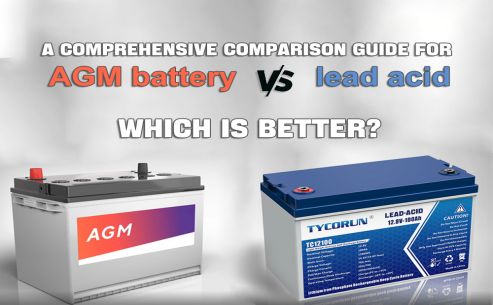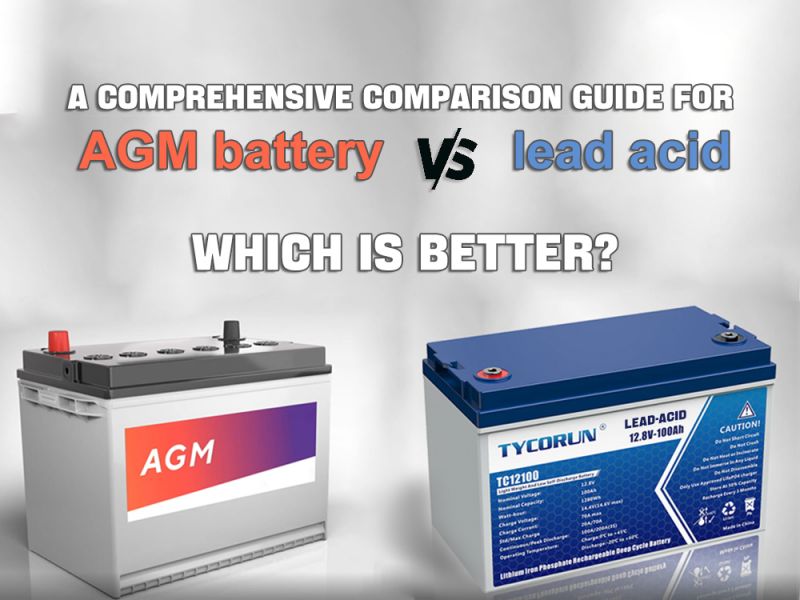
Main content:
- What is an AGM battery?
- Is an AGM battery lithium or lead-acid?
- Do AGM batteries last longer than lead-acid batteries?
- Benefits of using AGM vs. lead-acid batteries
- Demerits associated with using AGM batteries over flooded lead-acid batteries
- Are AGM batteries better than lead-acid batteries?
- Can you replace AGM batteries with lead-acid batteries?
- Do AGM batteries need a special charger?
- AGM vs. lithium battery - which one is better?
- Which is better lead acid battery or lithium battery?
- Comparison of AGM battery vs lead acid and lithium batteries
The best battery that will serve you effectively and efficiently is more important today than ever. There are different types of batteries today - examples include lithium batteries (both rechargeable and non-rechargeable), lead-acid, nickel-based, etc. There are several lead-acid batteries - a good example is the AGM battery. When comparing AGM battery vs lead acid, it is more advanced than the typical lead-acid battery, as you'll see in later sections of this article. This article is meant to help you understand:
- What an AGM battery is (what it is made of) and how it functions.
- AGM battery vs lead acid (key differences between these two battery types).
- Pros and cons of using the AGM battery over the traditional lead-acid battery.
- AGM battery vs lead acid vs. Li-ion battery - why using a lithium rechargeable battery could be the best option for you.
Let’s get started!
1.What is an AGM battery?
An AGM (Absorbed Glass Mat) is an advanced lead-acid battery that has super-fine glass mats sandwiched between lead plates inside the battery, it also known as AGM valve control accumulator. Since the glass mats are tightly packed between the lead plates, they are immune to vibration. This feature makes these batteries safer to use than traditional lead-acid batteries. You'll find 6V and 12V AGM batteries with a maximum capacity of 200 Ah. AGM batteries can be used almost everywhere - this battery's features make it usable in the military, aerospace, marine vessels, and cars/trucks/motorcycles.
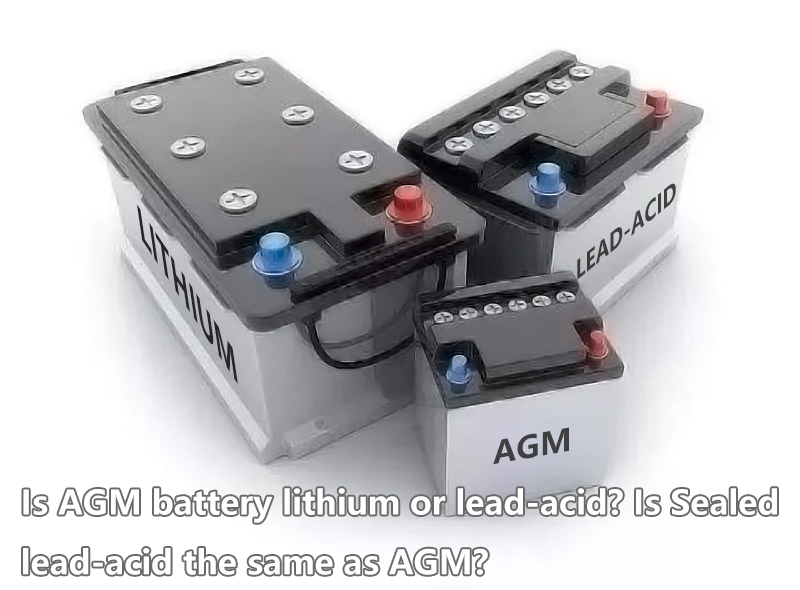
2.Is an AGM battery lithium or lead-acid?
AGM batteries are an advanced type of lead-acid batteries. In other words, there are no AGM lithium batteries. AGM batteries are sealed lead-acid batteries (SLA). It, therefore, means that the AGM battery is maintenance-free and they have no risk of leaking electrolyte. It is worth mentioning that lithium batteries also require no maintenance and are lighter than AGM batteries in similar applications due to their higher energy density.
3.Do AGM batteries last longer than lead-acid batteries?
You’re probably thinking to yourself: “AGM battery vs lead acid - which one will last longer than the other?” Here’s the truth: AGM batteries last longer than traditional (flooded) lead-acid batteries. AGM batteries have lower self-discharge rates - they can hold less capacity loss for longer durations even when not in use. In fact, the self-discharge rate of lithium-ion batteries is lower than the previous two, as low as only 3.5% per month.
In addition, AGM batteries can last up to seven years (around 1,200 charging cycles) - assuming that their handling is impeccable. On the other hand, standard lead-acid batteries will last for around three to five years if handled well. For lithium batteries, under the premise of charging and discharging once a day on average, their cycle life can reach 4,000 times, or 10 years (4000/365≈10.96).
4.Benefits of using AGM vs. lead-acid batteries
There are several advantages associated with using AGM batteries over lead-acid batteries. Check them out:
- AGM battery vs lead acid maintenance - AGM batteries are maintenance-free
- AGM battery vs lead acid charging speed - AGM batteries charge faster than flooded lead-acid batteries.
- AGM battery vs lead acid safety - AGM batteries are way safer than lead-acid batteries because they are leak-proof. In addition to that, AGM batteries are vibration resistant and can withstand extremely low temperatures.
- Higher power output - AGM battery’s internal structure helps it have a higher power output since there is minimal resistance compared to flooded lead-acid batteries.
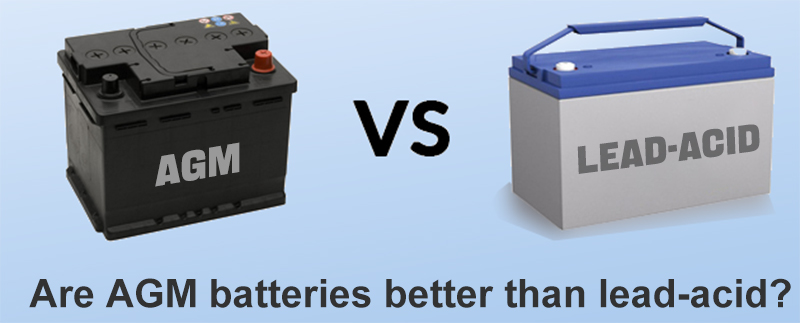
5.Demerits associated with using AGM batteries over flooded lead-acid batteries
As you've read, many benefits are associated with using AGM flooded lead-acid batteries. However, there are also disadvantages associated with using AGM batteries. Check them out:
- Cost of production - AGM batteries are way expensive compared to flooded lead-acid batteries.
- Highly sensitive to overcharging - AGM batteries are highly sensitive to overcharging. They can quickly get damaged. It would be best to use a smart charger over a traditional charger.
6.Are AGM batteries better than lead-acid batteries?
Considering the benefits associated with using AGM batteries over lead-acid batteries, it is logical to state that AGM batteries are by far better than lead-acid batteries.
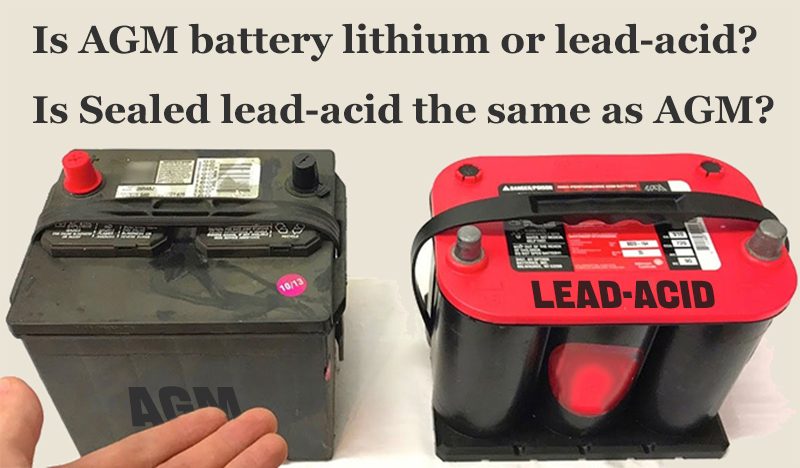
7.Can you replace AGM batteries with lead-acid batteries?
Yes, it is possible to replace AGM batteries with lead-acid batteries and vice versa. However, you’ll need to replace the batteries by ensuring that the batteries’ voltage and capacity are the same.
8.Do AGM batteries need a special charger?
The answer is yes, a dedicated charger is required to charge the AGM battery. Using a normal charger to charge an AGM battery tends to damage it. Because the ultra-fine glass fiber separator is used inside the AGM battery, excessive voltage or fast charging mode can easily cause damage to the internal separator, so it is necessary to use a special charger to charge the AGM battery.
9.AGM vs. lithium battery - which one is better?
There are several benefits associated with using both lithium and AGM batteries. However, lithium batteries are better than AGM batteries. Here’s how:
- Lithium batteries will last longer than AGM batteries in service life (lifespan).
- AGM batteries are sensitive to overcharging, while Li-ion batteries equipped with BMShave a cut-off technology that prevents the battery from overcharging and over-discharging. Choose a trustworthy professional battery store like TYCORUN ENERGY, we will provide you with more guaranteed products - the best lithium batteries with high-quality BMS. It would be best to note that lithium batteries have a more extensive discharge depth.
- Size and weight - AGM batteries have a lower energy density than lithium batteries. Therefore, lithium batteries are way lighter and smaller and pack more power compared to AGM batteries.
10.Which is better lead acid battery or lithium battery?
Lithium batteries are by far better than lead-acid batteries. Remember, AGM batteries are better than lead-acid batteries, and lithium batteries are better than AGM batteries. The primary demerit associated with using lithium over lead-acid batteries is the cost of production. Li-ion batteries are way expensive compared to lead-acid. However, the many benefits of lithium-ion batteries make their average daily cost much lower than that of lead-acid batteries, making them more cost-effective in the long run than lead-acid batteries.
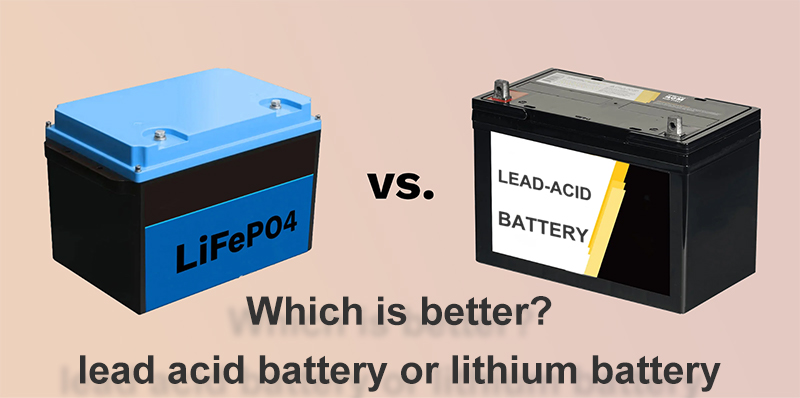
11.Comparison of AGM battery vs lead acid and lithium batteries
Check out the differences between these types of batteries summarized in the table below:
|
Attribute |
AGM |
Lead-acid |
Lithium |
|
Voltage |
2V per cell |
2V per cell |
3.7 per cell(Ternary lithium battery) |
|
Energy density |
70 Wh/kg |
60-70 Wh/kg |
250-450 Wh/kg |
|
Safety |
Safer than lead-acid |
Safe |
Safest (better than both lead-acid and AGM) |
|
Cycle life |
1,200 charging cycles |
300 charging cycles |
4,000 charging cycles |
|
Applications |
Aerospace, marine vessels, cars, motorbikes, trucks, military, etc. |
Backup power, cars, trucks, marine vessels, etc. |
Golf carts, trolling motor, motorcycles, RVs, UPS, drone, marine batteries, etc. |
Related article: Alkaline vs lithium batteries, solid state batteries vs lithium ion


